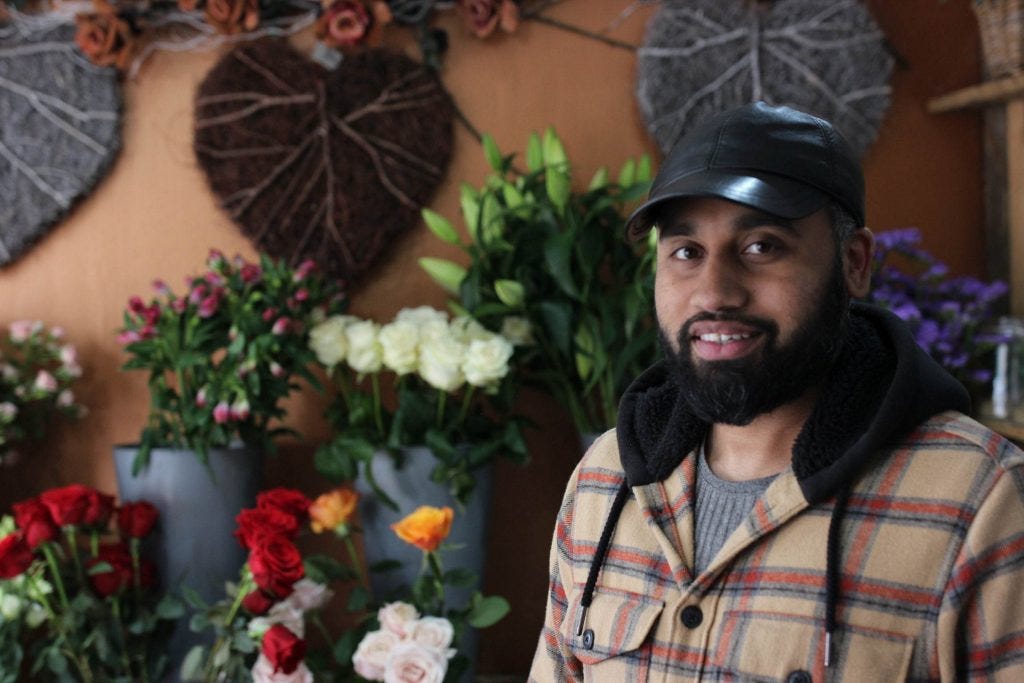Stems of Survival: Are Nature's Beauties a Dying Business Model?
Discovering Leytonstone's finest florist to see if they can adapt to the digital age of consumerism.
Emerging into his father’s business at just seventeen, Sharj reveals the downturns endured over the Lockdown period during Covid. Now thirty-four, the horticultural entrepreneur reflects on his blossoming journey into the industry of floristry. As specified by the Business Gateway, revenue in the florist industry is expected to climb at a compound annual rate of 2.8% over the five years through 2028-29 to £1.1 billion (IBISWorld, Florists in the UK, August 2023).

“It was difficult, we were closed- business shifted more online”
~ Sharj, Entrpreneur.
Noticing the peaks of footfall in consumers’ spending habits during quarantine, Sharj initiated a switch in focus to market his craft via digital media, maintaining an online business persona, using the tools of Instagram and TikTok, boosting his stores visibility and customer attraction.
Known for their stunning floral arrangements and local charm, Primrose Florist has began to embrace the digital age by establishing an online presence. They now offer a user-friendly website where customers can browse and order flowers for delivery or in-store pickup, alongside engaging social media platforms showcasing their verdant designs. Check out their website or drop them an in-person visit!
Pioneering Leytonstone’s High Street as "the only florist around here, and locals go-to flower shop", Sharj reveals the best awareness strategy that has positively impacted his business model and revenues, delineating the ease of direct communication through word-of-mouth marketing. “People that used to live in Leytonstone that have moved out, still come back to Leytonstone when they need flowers.”
Surviving in the business for over 20 years, Sharj remains detached from the spiritual side that Mother Nature has to offer, centering his interests purely on the visibly commercial factors of the flowers he sells. However, he states the scientific attributes that some flowers have on stimulating mood-boosting hormones. Gesturing across to the ‘Mother’s Tongue”, Sharj describes the plant to have natural indoor air filter purifying abilities, leaving the customer with great and positive vibes.
As International Women’s Day occurred last Saturday on the 8th of March, the demand for bouquets skyrocketed at Primrose Flowers, “It was crazy busy” Sharj remarked.
“I hate Valentines Day”
Sharing his least favourite celebration, Valentine’s Day, the florist admits that the holiday with the most revenue comes with the cost of added pressure applied in his work due to the expectations of arranging the flowers in the most presentably attractive way and delivering them at the generally popular time, typically after work around 4pm.
Highlighting the mass of orders that prominently arise in one part of the year, “December, February, March”, Sharj also highlights a huge portion of his time focusing on admin due to the pace of his slow trade: “It’s not busy every single day.”
“Floristry now is a dying trade, but it used to be very busy”
Pursuing his craft as a ‘dying trade’, the entrepreneur states how “twenty years ago, people were just coming and buying flowers with no reason whatsoever, every fortnight. Nowadays, you don’t see that anymore; people buy more materialistic things.” Leading us to question, why are the perishable goods of flowers being undervalued by society, and what initiated this disconnect?
Pondering the idea of selling the store after two decades of owning it, Sharj shared the responsibility of the inflated expenses and overhead costs that go into managing a floristry business. Though his unwavering appreciation for his father leaving him the store at age seventeen transcended his conventional plan of using his e-commerce and accounting degree to become an accountant, to which he added, “I can’t sit down and punch numbers”. Which ultimately left him with the choice of a much colourful and experimental future discovering the beauty in plants and nature.





I would associate floristry as an industry with destruction of nature as opposed to appreciation of it - one reason it's dying out, I suspect, is because people are expressing affection in more ethical, sustainable ways, perhaps with a living, growing plant for example